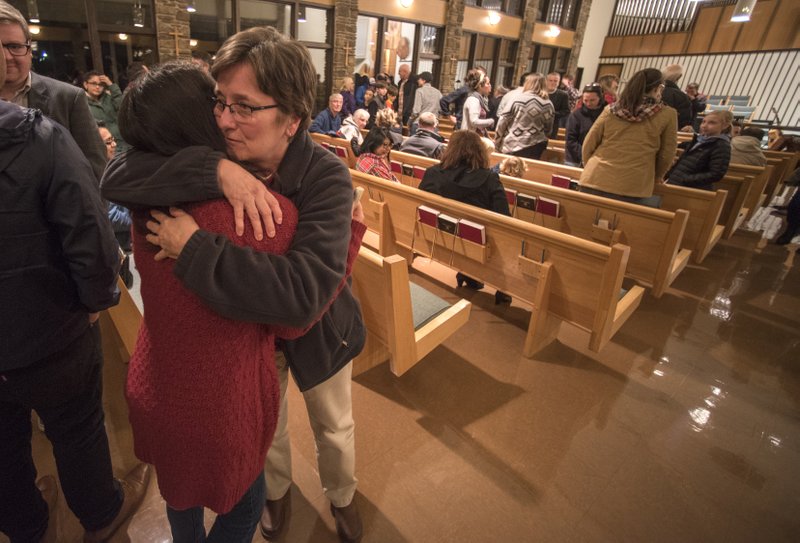SPRINGDALE — When Mayra Camacho’s father crossed the border from Mexico into the United States in 1993, he carried with him a desire for work and a dream to prosper.
Camacho, 26, spoke of her father’s dream during a Arkansas United Community Coalition news conference at the Immigrant Resource Center on Thursday. Camacho, an undocumented resident who works for the coalition, also spoke of the fear many undocumented residents now have.
“I am one of those who benefited from the executive order that went through in 2012 to allow undocumented youth immigrants to have a work permit and to be able to work and acquire a driver’s license and to be deferred from being deported, but that is only temporary,” she said. “It can be taken away at any time, at any moment.”
Camacho said that moment has loomed closer since President Donald Trump began to sign executive orders to further restrict illegal immigration and deport undocumented residents.
“The way it has affected us has been extremely hard, extremely hard to hear, to see, to the point where I’ve shut down any type of social media or news because I just don’t want to hear about it,” Camacho said as she began to weep. “It affects me directly. It hits home. It stabs me in the heart. It hits home with family, with friends, with neighbors. If feels not real.”
Camacho was flanked by religious leaders and refugee advocates who stood in solidarity for undocumented immigrants to remain in the United States.
“I think a majority of our faith traditions would really love see immigration reform that focus on keeping families together, giving people a path to citizenship, like the BRIDGE proposals,” said Clint Schnekloth, pastor at Good Shepherd Lutheran Church in Fayetteville.
The Bar Removal of Individuals who Dream of Growing our Economy Act is bipartisan legislation designed to allow people who have are either eligible for or have received work authorization and temporary relief from deportation through Deferred Action for Childhood Arrivals to continue living in the U.S. with permission from the federal government.
Camacho fears the Deferred Action is in danger as well.
“The idea of losing DACA is really hard to process. The possibility of losing my identity is there,” she said. “I’m on edge, and my fellow undocumented youth can relate.”
Camacho’s father entered Texas and got a job cleaning machinery at a chicken plant. One year later, 3-yearold Camacho and her mother entered the U.S. with the help of a family friend who was a U.S. resident.
“I was made to dress as a white girl to make it look like I was from [the United States], and we made it to where my mom was her sister and I was her daughter,” Camacho said.
Camacho grew up in Fort Smith. She was raised in a devoutly Catholic household that held true to vibrant Mexican traditions. Both of her parents worked hard. Her father often worked 60 hours a week.
“It was hard, but they were willing to persevere to give me a better life and a better future. They were willing to learn English, to do what they were willing to do and survive,” Camacho said. “They never showed any signs of stress, any signs of hardship. They just worked, and they fed me. All they would tell me is you need to go to school and you need to get an education.”
Camacho graduated from Northside High School and went on to graduate from the University of Arkansas-Fort Smith.
Emily Crane Linn, settlement director for Canopy Northwest Arkansas, an organization helping refugees resettle into the community, spoke during the news conference about the hopes refugees and immigrants bring with them to the United States. She said she has seen that hope in the faces of refugees.
“We’ve welcomed three refugee families so far, and I’ve had the privilege of being at the airport for two of them,” Linn said. “It’s amazing when they first see you and they realize that you are there for them, and just the relief that washes over their faces. They can tell that they are safe and they are welcome and they are home.”
The United States is the great bastion of immigrants and refugees, Schnekloth said.
“If you come in by ship to the United States, you go right past the Statue of Liberty, (and) that says ‘Give us your huddled masses yearning to break free,’” he said.
“There’s all these kinds of texts within our tradition that completely counter what we’re currently doing at both the state and national level. That’s why you’re seeing lots of communities of faith saying ‘No, we’re going to provide sanctuary, we’re going to stand together with immigrants and refugees.’ Whenever we stop doing that in our country, we’re forgetting our own history, we’re forgetting that we were once immigrants and refugees that came to these shores.”
Camacho said she will forever cherish her Mexican heritage, but she considers herself an American.
“No matter what anyone says, this is where my life has been established. You can’t just pack up and move,” Camacho said. “I feel very, very part of this country, and that’s what the U.S. is about.”
Hicham Raache can be reached by email at hraache@nwadg.com or Twitter @NWAHicham.
“We’ve welcomed three refugee families so far, and I’ve had the privilege of being at the airport for two of them. It’s amazing when they first see you and they realize that you are there for them, and just the relief that washes over their faces. They can tell that they are safe and they are welcome and they are home.”
— Emily Crane Linn, Canopy Northwest Arkansas

